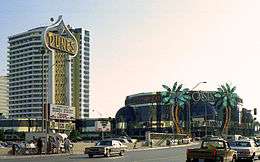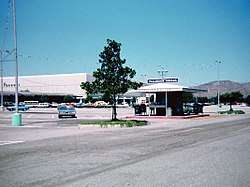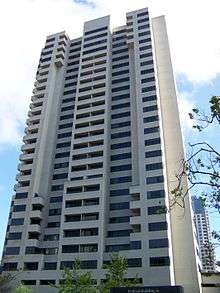Maxwell Starkman
Maxwell Starkman (November 17, 1921 – December 29, 2003) was a Canadian architect based in Los Angeles, California.
Maxwell Starkman | |
|---|---|
| Born | November 17, 1921 Toronto, Ontario, Canada |
| Died | December 29, 2003 (aged 82) Los Angeles, California, U.S. |
| Alma mater | University of Manitoba |
| Occupation | Architect |
| Practice | Maxwell Starkman Associates |
| Buildings | Museum of Tolerance |
Biography
Early life
Maxwell Starkman was born in 1921 in Toronto, Canada.[1][2] He served in England, France, Belgium and Germany during World War II.[1][2] He graduated from the University of Manitoba.[1][2]
Career

He moved to Los Angeles, California in 1950.[1] Shortly after, he started working for Richard J. Neutra.[1] In 1953, he started Reichl and Starkman Architects with fellow architect Fritz Reichl.[1] After Reichl died in 1954, he established Maxwell Starkman Associates, an architectural firm.[1] He mostly built tract homes for returning G.I.s.[2][3]

Later, he built commercial buildings such as shopping malls and drugstores.[2] For example, he designed the Park Place Shopping Center and the Sunrise City Shopping Center along the Maryland Parkway in Las Vegas, Nevada.[2] He also designed the Fallbrook Center in West Hills and some student housing at California State University, Los Angeles. Later in the 1960s, he designed the Melodyland Theater in Anaheim.[1] Additionally, Starkman designed the Dunes hotel and casino, which was later demolished and replaced with the Bellagio.[2]

In 1972, he designed the Zenith Tower located at 6300 on Wilshire Boulevard, near Carthay Circle.[3] It was built for the Zenith National Insurance as a sixteen-story skyscraper.[3] Later, he designed the Sony Pictures Plaza.[1] He also designed the Meridian Condominiums, a skyscraper in San Diego. His last design was the Museum of Tolerance.[1]
He retired in 1987.[1]
Personal life
He was married to Gloria Starkman.[1] They had three sons and one daughter: sons David, Laurence, Robert, and Nancy.[1] He became a widower when his wife died in 1992.[1]
Death
He died on December 29, 2003.[1]
Legacy
The Maxwell Starkman Scholarship in Architecture at the University of Manitoba is named in his honor.[4]
References
- Oliver, Myrna (January 5, 2004). "Maxwell Starkman, 82; Architect for Sony Plaza, Museum of Tolerance". Los Angeles Times.
- "Dunes hotel tower architect Starkman dies". Las Vegas Sun. January 26, 2004.
- "Zenith Tower". Los Angeles Conservancy. Retrieved 8 December 2014.
- Canadian Scholarships